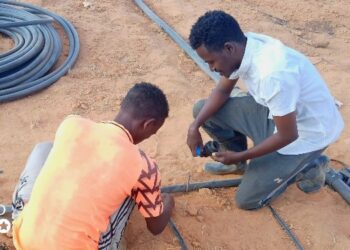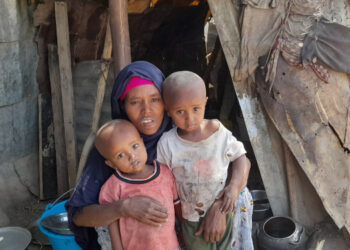(ERGO) – Families from Qoryoley, who once supported themselves from the proceeds of their farms and small trade, have been victimised by an upsurge in conflict between two local clans, compounded by Al-Shabab attacks, making this part of Lower Shabelle region one of the most unstable and vulnerable parts of Somalia.
Mohamed Adan Hassan’s family of seven is now depending on cooked food shared by neighbours in Al-Hidaya displacement camp in Elasha-Biyaha, also in Lower Shabelle, where conditions are a far cry from their self-reliant life at home.
“Our situation is very bad,” Mohamed told Radio Ergo. “We only get food once a day, and sometimes we don’t even get that. What little we receive is not enough for us. We are people affected by conflict and living through this hardship.”
Mohamed has searched for casual work to support his family but has found no opportunities, leaving him increasingly hopeless.
They have to beg for a single jerry can of water from local residents as they can’t afford the 4,000 Somali shillings charged at private boreholes.
The fragile hut made from sticks and worn-out cloth donated by the host community is poor shelter for the children, especially the youngest, a three-month old baby.
“Our biggest worry is that it’s the rainy season and we have no proper shelter. We don’t have plastic sheeting to keep the rain out, we have no bedding, and the shelter is in a miserable condition. It is too small and uncomfortable, but we have no choice. We are waiting for God to give us another way out,” Mohamed said.
Mohamed’s family lived in a two-room stone house with a borehole, kitchen, and toilet on their three-hectare farm in Qoryoley. He ran a shop selling basic goods. The stock worth around $2,000 was looted or burned. His farm, which had food crops and vegetables close to harvest, was taken over by clan militias. He had invested $250 in planting his farm, but recovered nothing.
The conflict also deprived two of his children of their education, as he had been paying $20 a month for their primary and lower-secondary schooling.
He can’t afford the $5 monthly fee charged in schools near the camp, which itself has no amenities at all – no water, healthcare, nor education services.
Mohamed’s family walked the 92 kilometres from Qoryoley to Elasha-Biyaha over two days and nights when they had to escape. He doesn’t think it’s safe to go back as the conflict continues.
“We lived a good life back home, I worked on my own farm, ran my business, and the children had access to education. Now we have become displaced people with nothing in our hands,” he said.
Amina Ali Ibrahim, who is also among the conflict displaced families, said she struggles to feed her nine children once a day with whatever they can beg from local residents. Her youngest child is three years old. On nights when nothing is found, the children sleep hungry.
“My family is living in severe hardship. We cannot get food, medicine, or water. The camp has no water pipes. We use water we beg from neighbours because we can’t afford to buy it. We are not used to living on so little water – we used to drink from our own taps,” she told Radio Ergo’s local reporter.
Her family sleeps now in a pitiful hut made of cloths and branches, whereas in Qoryoley they had their own three-room stone house with a kitchen and toilet.
Amina is also worried about a $150 debt for food and basic items she bought for her children while still in Qoryoley.
“The person I owe keeps calling, asking for their money. I told them I am displaced and can’t afford anything, but they keep calling. I hope I can pay if God provides something. Otherwise, I have no way to repay,” she told Radio Ergo.
Displacement means she now shoulders the entire responsibility for the family, as her husband is elderly and unable to contribute. She has failed to find cleaning work, and misses her earnings of $5 a day selling fresh vegetables in the streets of Qoryoley.
The head of Al-Hidaya camp, Ibrahim Hassan Muse, told Radio Ergo that none of the nearly 600 displaced families registered since September had received assistance so far. Elasha-Biyaha is on the northern outskirts of greater Mogadishu, less than 20 kilometres from the capital.
“These people are in a dire situation. As camp management, we can only appeal to humanitarian agencies. They urgently need food, water, and shelter,” he said.
The families in the camp come from Qoryoley as well as other conflict-affected areas of Lower Shabelle region.









